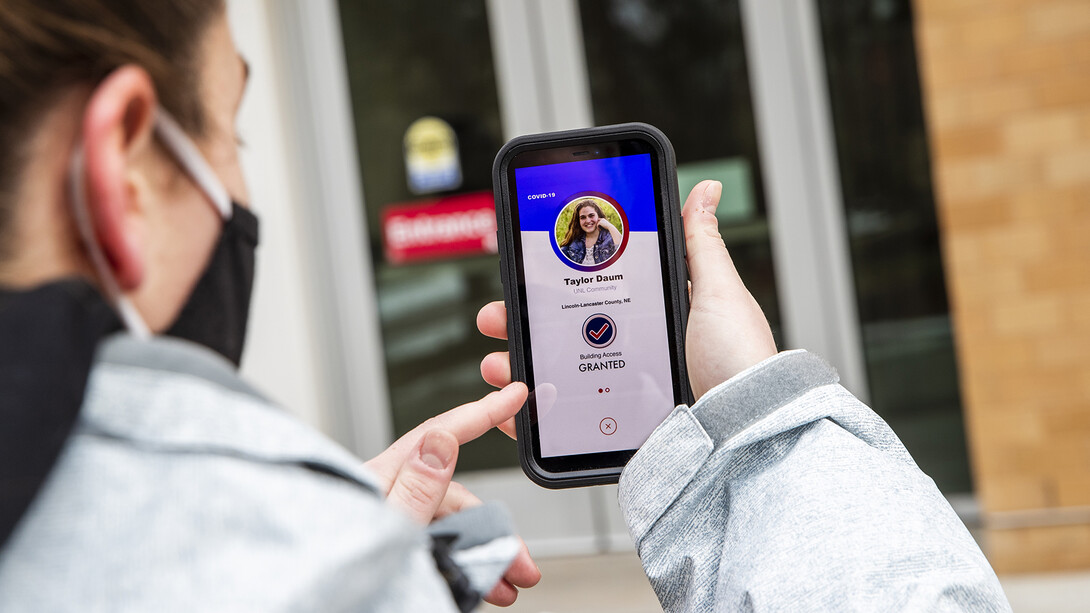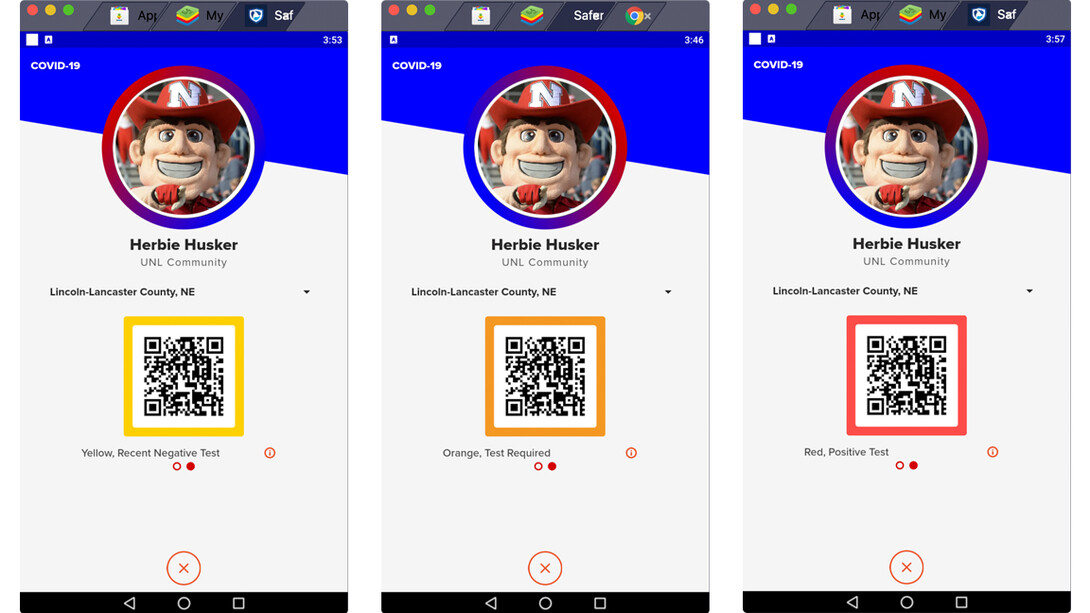
As part of its multi-layered approach to limit the spread of COVID-19, the University of Nebraska–Lincoln will start the spring 2021 semester with a required saliva-based testing program.
Announced in a Jan. 11 email from Chancellor Ronnie Green and following the direction of the Lincoln-Lancaster County Health Department, all students, instructors (including faculty) and staff who will be on campus in the spring semester must participate in the testing. Those individuals must complete two rounds of the saliva-based testing to maintain access to campus facilities.
The testing, which will be linked to Safer Community, a smartphone app, will begin for the majority of the campus community during the week of Jan. 19 (some units which start courses before Jan. 25, including the College of Law, are being tested the week of Jan. 11). Individuals who are not tested once and receive a COVID-19 negative result by Jan. 25 will not be cleared to be on campus when the spring semester begins.
“We remain guided, as we were last fall, by the priority of offering as much in-person education as we can safely provide,” However, doing so safely in January will look different than it did in August.
“Our new safety measures are designed to meet the current conditions of the COVID-19 pandemic, and provide us with the flexibility to adapt as either conditions improve or new challenges emerge, and as vaccines become available.”
Students, instructors and staff who will not be on campus in the spring semester are not required to be tested. Additional information about exemptions from the testing are available here.
The saliva-based testing initiative utilizes space within the university’s Veterinary Diagnostic Center to process results. Samples will be collected at multiple stations located on City, East and Nebraska Innovation campuses. The collection process is easier and less-invasive than the nasal-based testing available in the fall semester and offers faster results, most likely within 24 hours.
Students, instructors and staff will be able to schedule testing through the Safer Community app, which will soon be available for iOs and Android users. Access will also be available via a website.
When on campus, students, instructors and staff must be prepared to show the “Access Granted” status card available on the app to Wellness Attendants stationed at academic buildings, campus recreation facilities and dining halls.
Students, instructors and staff who do not have a smartphone will be able to access the testing program and print status cards via the website. Kiosks located at the 17th and R streets parking garage on City Campus and in the East Campus Service Building will also be available to print an “access granted” pass.
The two tests at the start of the spring semester should be completed within a 10-day window to avoid an interruption in access to campus facilities.

The “access granted” pass via the app features an image of the individual, protections against forgery, and a check mark that allows building access or an “X” that denies access. Wellness Attendants will be looking for the “X” or checkmark symbols.
The app also uses three colors to indicate an individual’s status within the university’s testing protocol — yellow, which indicates a negative test result; orange, for a first-time user, past due test, self-reported symptoms, exposure notification or quarantine status; and red, for a positive COVID-19 test result.
Availability of the app and access to appointment scheduling will be announced. Instructors, staff and graduate assistants are urged to schedule their initial tests on Jan. 19 or 20, prior to the start of students returning on Jan. 21.
The university plans to work with the Lincoln-Lancaster County Health Department to determine if additional saliva-based testing will be needed during the semester. Details will be announced.
The saliva-based testing program is exclusively for individuals who are not symptomatic or do not suspect exposure to the virus. Free on-campus testing, via nasal swabs, for individuals who believe they are showing COVID-19 symptoms or suspect exposure is available at East Memorial Drive. The location will move to immediately east of the Cather Dining Center on 17th Street, between R and Vine streets.
Testing availability is part of the university’s multi-layered approach to limiting the spread of the virus on campus and in the greater Lincoln community. Other elements of the program include the use of facial coverings, social distancing, greater hygiene, including handwashing and access to hand sanitizers, focused cleaning and HVAC upgrades. Learn more here.

COVID-19 policies continued, updated
The university continues to offer a variety of policies to protect the campus community from the virus. These include encouragement to supervisors for employees to work remotely whenever possible and an exemption request process for employees. A list of continued, updated and new policies is available here.
Vaccine availability
The university is working with local and state health officials to formulate a plan for vaccine distribution for the campus community. Details on those plans will be announced when available.
“We begin 2021 with hope. We know this virus is unpredictable, the recent discovery of a more transmissible variant is proof of that,” Green said. “Yet our UNL community — students, faculty and staff — have already proven we can adapt, be resilient and succeed beyond measure.
“In his words of advice to our December graduates, alumnus Warren Buffett said there was no one he would rather be than a student graduating from UNL today. I couldn’t agree more and look forward to another successful spring semester and to celebrating a new round of Husker graduates in May.”







